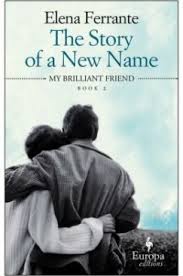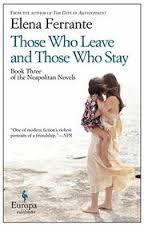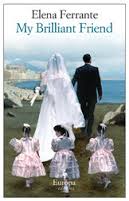“I concluded that first of all I had to understand better what I was. Investigate my nature as a woman. I had been excessive. I had striven to give myself male capacities. I had thought I had to know everything, be concerned with everything. What did I care about politics, about struggles. I wanted to make a good impression on men, be at their level. At the level of what, of their reason, most unreasonable. Such persistence in memorizing fashionable jargon, wasted effort. I had been conditioned by my education, which had shaped my mind, my voice. To what secret pacts with myself had I consented, just to excel. And now, after the hard work of learning, what must I unlearn. Also, I had been forced by the powerful presence of Lila to imagine myself as I was not. I was added to her, and I felt mutilated as soon as I removed myself. Not an idea, without Lila. Not a thought I trusted, without the support of her thoughts. Not an image. I had to accept myself outside of her. The gist was that. Accept that I was an average person. What should I do. Try again to write. Maybe I didn’t have the passion. I merely limited myself to carrying out a task. So don’t write anymore. Find some job. Or act the lady, as my mother said. Shut myself up in the family. Or turn everything upside down. Home. Children. Husband.” Those Who Leave and Those Who Stay, Elena Ferrante
I don’t often read books in translation, but when I visited Sicily this summer I decided to bring along a contemporary Italian writer. I chose Elena Ferrante and her trilogy of Neapolitan novels – a fourth novel will be published next year – not realizing what an incredible reading experience it would turn out to be.
Elena Ferrante is a pseudonym. The author of My Brilliant Friend, The Story of a New Name, and Those Who Leave and Those Who Stay does not grant in-person interviews. She does not do book signings or promotional tours. Even her translator, Ann Goldstein, has never met this international literary sensation.
There is a rumor that Elena Ferrante is a man, which many female readers find absurd. A myth, they say, spread by condescending males who think a woman wouldn’t write about male-female relations in the way that Ferrante does. I would be surprised and disappointed if Ferrante is ever revealed to be male. Certainly, such a thought never occurred to me as I read her novels. To me, she seems authentically female, though one who is remarkably uninhibited and self-revealing: a kind of brutal honesty born of the harsh, corrupt city where her novels are set. It could be that professional anonymity gives Ferrante the freedom to write in this unfettered way. But I have the feeling that Ferrante’s strong, unusual voice would prevail regardless of her circumstances.
 The Neapolitan novels span the 1950s to the present, depicting the fraught friendship of Elena Greco and Lila Cerullo, who live on a violent, poverty-stricken Naples stradone, and the fates of their neighborhood friends. Elena manages to become educated and lift herself out of poverty. She writes a bestselling novel, marries an esteemed professor of literature and “escapes” the old neighborhood. Lila, who Elena views as the more brilliant and talented of the two, is not permitted to attend school beyond the fifth grade. She fashions a very different kind of life that remains enmeshed in the corruption and conflict of Napoli.
The Neapolitan novels span the 1950s to the present, depicting the fraught friendship of Elena Greco and Lila Cerullo, who live on a violent, poverty-stricken Naples stradone, and the fates of their neighborhood friends. Elena manages to become educated and lift herself out of poverty. She writes a bestselling novel, marries an esteemed professor of literature and “escapes” the old neighborhood. Lila, who Elena views as the more brilliant and talented of the two, is not permitted to attend school beyond the fifth grade. She fashions a very different kind of life that remains enmeshed in the corruption and conflict of Napoli.
The friendship between these two women is arresting, electrifying. Lila and Elena love each other but visit treachery and betrayal upon one another, too. Lila takes the lead with bold, unconventional action; Elena reacts, making important life decisions almost in the wake of Lila. Elena senses Lila is the true, more talented writer, the one more deserving of success; she consciously crafts her own writer’s voice from a story Lila wrote as a child. No one knows Elena better than Lila, and vice versa. If one woman were to die, the other would lose her identity, and her life would be stripped of much of its meaning.
These novels remind me of the movie The Best of Youth in its depiction of an Italian family caught up in the cultural and political upheaval of the 1960s. Feminism is a strong theme, but as the decades pass, in these Neapolitan novels, men and women do not seem to make any progress understanding each other. Do you remember the vitriolic scene in The Godfather when Connie (Talia Shire) hurls the wedding china at her husband, Carlo (Gianni Russo) and they scream at each other? I thought of them when I read Ferrante’s riveting depiction of Lila’s wedding night. Returning from her honeymoon with a black eye, Lila visits her mother, who looks the other way, saying nothing. Such a thing was not out of the ordinary.
If you appreciate complex psychological portraits of women and female friendships, you will like these novels. I enjoyed them, too, for their depiction of Elena’s emotional and creative challenges as a writer, and because they helped me better understand the problematic history of women’s roles in Italian family and culture. The novels will resonate for anyone who has reinvented themselves through geographical distance or education or immersion in a different stratum of society. We see Elena renouncing the rough dialect of Naples for cultured Italian, yet reverting to the aggressive language of her childhood when she’s angry or upset. Elena hovers between two identities: alienated from her people and place of origin, yet never really at home in her new life.
 This article in Slate is one of the better reviews I’ve read of Ferrante’s Neapolitan novels. There is an excellent discussion of Elena Ferrante by her translator Ann Goldstein and others in this New Yorker: Out Loud interview.
This article in Slate is one of the better reviews I’ve read of Ferrante’s Neapolitan novels. There is an excellent discussion of Elena Ferrante by her translator Ann Goldstein and others in this New Yorker: Out Loud interview.
I plan on reading the fourth novel next year when it is published. Have you read any novels by Elena Ferrante? If so, what do you think?


I’ve just finished the first two and I am now starting on Book 3, I loved the first two and am enjoying reading some of the criticism, not just a great story but so much else that is illuminated through them, the traditional path versus education and both girls trying to rise above or away from those neighbourhood expectations, one through marriage the other through education. So glad to hear you read them during your travels, a fascinating writer indeed. I’ve just reviewed Book 2, come by and visit 🙂
Thanks, Claire, I read your post about the first book, looking forward to the next one. I think it’s great we’re both reading her right now.
I’ve never heard of this writer or these novels, but I’m intrigued. More to add to my reading list